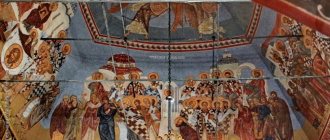There are many different opinions on this topic. Some clergy say that you can go to church during your period. But most of them claim that this is prohibited. Many women are interested in knowing at what time during menstruation they can attend church, and whether it is possible at all. Much has changed since the times of the Old Testament; now almost no one blames a woman for the presence of such a natural process as regula. But many churches have restrictions and rules of behavior for women who decide to attend church during menstruation.
Is it possible to go to church while on your period?
The content of the article:
Many women are interested in the question of whether it is possible to go to church with menstruation. Nowadays, more and more clergy agree that women who are on their menstrual periods are allowed to enter church. However, some rituals are recommended to be postponed until the end of menstruation. These include baptism and wedding. Also, many priests do not recommend touching icons, crosses and other church attributes during this period. This rule is only a recommendation and not a strict prohibition. The woman herself has the right to decide what exactly to do. In some churches, the clergyman may refuse to conduct confession or a wedding, but a woman has the right, if she wishes, to go to another church, where the priest will not refuse her this. This is not considered a sin, since the Bible itself does not reveal any prohibition related to the presence of menstrual periods for women.
The rules of the Russian Orthodox Church do not prohibit girls from visiting the temple during regul. There are some restrictions that priests strongly recommend adhering to. Restrictions apply to Communion; it is better to refuse it during menstruation. The only exception to the rule is the presence of any serious illness.
Many clergy argue that you should not avoid going to church on critical days. Menstruation is a natural process in the female body, which should not interfere with being in the temple. Other priests share this opinion. They also claim that menstruation is a natural process that is caused by nature. They do not consider a woman “dirty” and “unclean” during this period. The strict ban on visiting the temple remains in the distant past, during the times of the Old Testament.
What Came Before – Old Testament
Previously, there was a serious ban on visiting church while menstruating. This is because the Old Testament views menstruation in girls as a sign of “uncleanness.” In the Orthodox faith, these prohibitions were not written down anywhere, but there was also no refutation of them. This is why many still doubt whether it is possible to come to church while menstruating.
The Old Testament views menstruation as a violation of human nature. Based on it, it is unacceptable to come to church during menstrual bleeding. Being in the temple with any bleeding wounds was also considered strictly prohibited.
Origins of the creation of man and woman
The step-by-step creation of the Universe can be studied in the Bible in the Old Testament. God created man in his own image on the 6th day - the man Adam and the woman Eve. This means that woman was created pure from the beginning, without menstruation. Conceiving a child and childbirth were supposed to take place without pain. In a perfect world there was nothing bad. Absolutely everything was clean: body, thoughts, thoughts, actions. However, such perfection did not last long.
The devil in the form of a serpent seduced Eve into eating the apple. After which she was supposed to become powerful, like God. The woman tasted the apple herself and gave it to her husband. As a result, both committed sin. And this fell on the shoulders of all humanity. Adam and Eve were expelled from the holy land. God was angry and predicted the woman would suffer. “From now on you will conceive in pain, give birth in pain!” - he said. From this point on, the woman is theoretically considered unclean.
How they think now - New Testament
At the moment, there is no strict ban on visiting the temple on critical days. The shedding of human blood is prohibited in churches, but menstruation no longer applies to this. An example can be given: if a person is injured while in the temple, then it is necessary to immediately leave, as this is considered desecration of shrines. Women are allowed to be in the temple, but be sure to remember to use reliable personal hygiene products. With their use, it can be assumed that bleeding does not occur.
Temples are considered a holy place, so some behavior of girls during the regul is unacceptable. On this issue, the clergy do not agree on a single opinion. Some of them believe that during this period all rituals are prohibited for women, as well as touching icons and all church paraphernalia. Others argue that the restrictions are minimal. Almost all priests currently prohibit such rites as Baptism and Wedding. It is recommended to wait until the end of menstruation and only then go to church. They do not prohibit praying or lighting candles. Some allow Communion during menstrual periods, especially when a woman especially needs it. For example, if there is a serious illness.
Many clergy adhere to modern views and believe that menstruation is a natural biological process that should not interfere with a girl if she wants to attend church.
If in the times of the Old Testament it was strictly forbidden to come to church, perform rituals, pray, and also touch icons, now these rules have changed enormously. It has become more often mentioned that the girl is not to blame for such a process as the menstrual cycle, because it is explained by physiology. This allows her not to feel guilty. The modern church does not blame a woman for the fact that the pregnancy did not take place. Most clergy do not consider girls “unclean” on critical days, which means that their appearance in the temple does not desecrate the shrines in any way.
Christians and the law
Sister Vassa, in her excellent article, seems to argue that the Old Testament rules about ritual purity are contrary to Christian anthropology and soteriology. This argument is based on the general proposition that “Orthodox Christians, men and women, were purified in the waters of baptism, buried and resurrected with Christ, who became our flesh and our humanity, trampled death underfoot and freed us from its fear.”
In my previous post I pointed out some factors that Sister Wassa does not address. Here I want to provide additional written evidence in order to more carefully examine the prohibitions of the Old Testament, especially regarding bleeding.
In the Holy Scriptures we find words that go against the idea that “there is nothing unclean in itself” (Rom. 14:14): “For it pleased the Holy Spirit and us not to lay on you any more burdens than these necessary things.” : to abstain from sacrifices to idols and blood, and strangulation, and fornication, and not to do to others what you do not want to do to yourself. By observing this, you will do well. Be healthy” (Acts 15:28,29).
Of course, most relevant to our theme in this passage is the commandment to abstain from blood (as food), also found in the Book of Leviticus (17:11,12). Therefore, keeping the Old Testament rule about purity “accepts the Holy Spirit”
It should not be thought that there were dietary or sanitary reasons for observing this rule; other peoples consumed blood without much harm to health. Saint Clement of Alexandria (150-215) reports about such people and about Christian customs: “tired and hungry, he (the Scythian) demands food from the horse; and she opens her veins to him and calms him with the only thing she has - her blood. … May they perish, these brutal camel drivers, for whom the blood of these animals serves as food!” (Educator 3:4) (8). Elsewhere, St. Clement refers to a passage from the Acts of the Apostles (15:28,29) in which he acknowledges the authority of the Holy Spirit and the Apostles, especially Paul (Stromata 4:15) (9).
Of course, St. Clement was from Alexandria; and Sister Wassa admits in her article that judgments of "Egyptian origin" support the tradition of women abstaining from Communion during menstruation. She makes it clear that this is due to some features of the “socio-cultural historical reality of the ancient world, which greatly believed in and demanded ritual purity.”
On the other hand, Sister Bassa argues that "it was more typical for these authors to consider any precepts of the Mosaic Law to be symbolic, with the exception of those relating to gender and sexuality." However, this is not quite true. Tertullian (160-220), for example, writes about things unacceptable for Christians: “All this makes Christians blush, who do not even taste the blood of animals... Finally, among the tortures of Christians you use, there are botulinums filled with blood. You know very well that Christians are not allowed to do that through which you want to turn them away from Christianity” (Apology 9) (10).
We advise you to study How to pray to God so that he hears and helps
Also, Marcus Minucius Felix (200) writes: “we are so afraid of shedding human blood that we even abstain from the blood of animals that we use for food” (Octavius 30) (11). Of course, the Old Testament is not mentioned here to explain the reason why Christians are afraid to “shed human blood,” but in the second part of the quotation we cannot exclude ancient Jewish influences on the dietary practices of Christians. We can find similar excerpts with reference to the Acts of the Apostles in Origen and in the Apostolic Constitutions.
Although the remnants of Jewish dietary rules, the observance of which were “pleasing to the Holy Spirit” and the Apostles, may not be directly related to the rules regarding menstruation, a complete rejection of the Old Testament rules seems unjustified.
We will not discuss the importance of the prohibition of drinking blood for our time, but much later than the first two or three centuries of Christianity, Eastern Christians continued to adhere to these rules. In 1054, Patriarch Michael Cerularius of Constantinople (1000-1059), in a letter to the Patriarch of Antioch, among other things, mentions that the Romans “Judaize” eat unclean meat (12)
It is noteworthy that by that time in the East, adherence to certain dietary restrictions was considered a Christian custom, while their violation was assessed as Judaism. However, more precisely, we were talking about some scrupulousness of the Byzantines and the lack of it among the Europeans.
The opinion of the priests
As mentioned above, the opinion of priests on the question of whether it is possible to go to church during menstruation has not come to a single denominator. The Bible does not give a precise answer and does not prohibit visiting holy places during menstruation. Therefore, every woman is recommended to ask this question to a priest. But it is worth considering that the answers may vary. If in one temple a girl is prohibited from coming, then in another, perhaps, there will be absolutely no restrictions. A woman will be allowed to pray, light candles, receive communion, and also touch icons.
Most clergy do not allow girls to touch shrines during menstrual periods. In this case, you should not refuse to visit the temple, because a woman is allowed to pray.
Many girls are concerned about the question of whether it is possible to come to the temple during menstruation if they currently have a serious illness. In this case, almost every priest will allow you to visit the church without any restrictions. If a woman wants to take communion and confess, then she should not be stopped by the presence of regulations. In this case, most clergy are understanding. Although the opinion of priests on the issue of visiting church during menstruation is ambiguous, most of them agree on one thing - during illness, any person has the right to prayer, confession and any ritual. If there is an illness, then the woman is not limited, she can touch the icons.
About visiting a mosque during menstruation by Muslims
Most Islamic scholars are convinced that women should not go to the mosque during their periods. But this doesn't apply to everyone. Some representatives believed that no such ban should exist. It should be noted that even a negative attitude towards women visiting the mosque during menstruation does not apply to extreme cases when the need is great and undeniable. Outside of discussion is the situation when a woman desecrates a mosque with her discharge in the literal, physical sense. Such behavior is indeed subject to the strictest prohibition. However, women are allowed to attend Eid prayers.
What to do anyway
Everyone must decide for themselves whether it is possible to go to church while on their period. The Bible does not reflect a categorical prohibition; it does not discuss this issue in detail. Therefore, a woman has the right to do as she sees fit.
Before going to a holy place, it is better to decide when is the best time to go to church. Many will not be able to visit the temple in the first days after the start of menstruation, but this has nothing to do with any prohibition. This is due to the fact that for most women, the onset of menstruation is accompanied by severe pain, general malaise, nausea and weakness. Many people will find it difficult to be in such a state in the temple. A woman may become ill; it is recommended to avoid such situations. It is better to postpone going to church until the end of the critical days or until the moment when the condition returns to normal.









